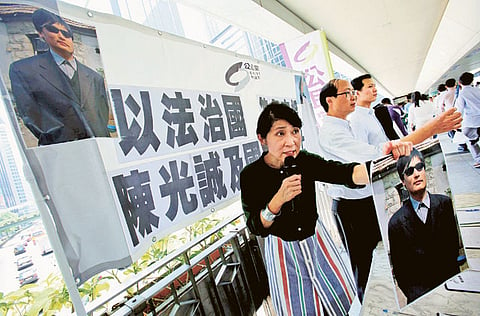China denounces Washington as dissident Chen leaves embassy
Beijing wants Washington to apologise and punish those responsible

Beijing: Chinese dissident Chen Guangcheng left the US Embassy yesterday in Beijing "of his own volition" after being there for six days, state media said yesterday, as China denounced the United States for interfering in its internal affairs.
A brief report by the Xinhua news agency broke China's media silence. A senior US official confirmed that Chen was out of the embassy.
"Chen Guangcheng has arrived at a medical facility in Beijing where he will receive medical treatment and be reunited with his family," said the official who requested anonymity.
China's Foreign Ministry said it was extremely unhappy the embassy had taken Chen in.
"It must be pointed out that the United States Embassy took the Chinese citizen Chen Guangcheng into the embassy in an irregular manner, and China expresses its strong dissatisfaction over this," ministry spokesman Liu Weimin said in a statement carried by Xinhua.
"The US method was interference in Chinese domestic affairs, and this is totally unacceptable to China. China demands that the United States apologise over this, thoroughly investigate this incident, punish those who are responsible, and give assurances that such incidents will not recur."
International disputes
Chen's plight has overshadowed the Strategic and Economic Dialogue due to begin today. The United States hopes the talks will encourage greater Chinese cooperation on trade as well over Iran, Syria, North Korea and other international disputes.
Relations could easily go awry, especially with the ruling Communist Party wrestling with a leadership scandal and a looming power succession.
"Of course, as the US must realise, this does quite a lot of harm to China-US relations," Shi Yinhong, a professor of international relations at Renmin University in Beijing said of Chen's flight into US protection.
"In this situation, both sides want to restrict the impact of this [Chen] incident. But whether they can find a way to resolve the problem relatively quickly depends on how the dialogue and discussions go," Shi added.
Washington is preoccupied with President Barack Obama's bid for re-election late this year, but ructions in Chinese domestic politics have dogged ties, causing the Obama administration to tread carefully in dealing with Beijing which faces a leadership succession late this year.
"The vulnerability on the part of the Chinese leadership may in turn make decision-makers even more cautious in foreign policy issues," said Cheng Li, an expert on Chinese politics at the Brookings Institution, a think-tank in Washington D.C.
Delicate balance
"It is also a daunting challenge for the United States to find a delicate balance between adhering its principles about human rights, rule of law and democracy on the one hand, and maintaining cooperative and constructive relationship with the Chinese government on various important issue areas on the other hand."
A commentary in China's official People's Daily overseas edition said the United States was "disturbing still waters" by setting up military bases in Asia, selling weapons to the region and interfering in the South China Sea dispute.
Sign up for the Daily Briefing
Get the latest news and updates straight to your inbox


